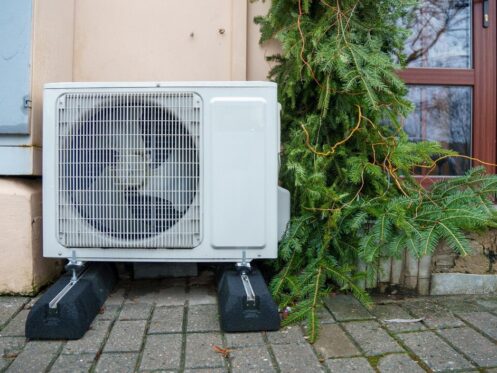Keeping your heat pump in optimal condition is crucial for maintaining comfort in your Palmdale home. Heat pumps are efficient systems that help regulate indoor temperatures, whether it’s for heating during cool nights or cooling as the summer heat sets in. Regular maintenance of these systems ensures that they continue to operate effectively, avoiding unexpected issues and maintaining energy efficiency. One essential aspect of this upkeep is checking the refrigerant levels in your heat pump. Having the correct refrigerant level not only supports your system’s efficiency but also extends its lifespan.
Refrigerant plays a vital role in the operation of heat pumps, facilitating the transfer of heat to maintain a comfortable indoor climate. Over time, the refrigerant level can become unbalanced, either through leaks or other issues, compromising the system’s performance. Maintaining proper refrigerant levels is not just about efficiency; it’s also about preventing potential damage to your system. By understanding the importance of refrigerant level checks, you can ensure that your heat pump is prepared to serve your household’s needs year-round.
Understanding Heat Pump Systems and Refrigerant
Heat pumps operate by transferring heat from one place to another, making them a versatile and energy-efficient choice for homeowners in Palmdale. In simple terms, these systems extract heat from the outside air or ground and move it indoors during cooler months. During warmer months, the process is reversed to provide cooling. The refrigerant is the medium that facilitates this heat transfer process, circulating through coils and changing states from liquid to gas and vice versa to move heat efficiently.
Refrigerant levels are crucial for the optimal performance of heat pumps. An insufficient amount of refrigerant can impede the system’s ability to heat or cool effectively, leading to uneven temperatures or increased energy consumption. This can also place additional strain on the unit, potentially leading to more serious mechanical issues over time. There are different types of refrigerants used in heat pumps, and it’s important to ensure the correct type and amount is maintained in your system.
Common types of refrigerant include R-410A and R-22, with R-410A being more environmentally friendly and widely used in newer systems due to its efficiency and safety features. Knowing what type of refrigerant your heat pump uses can help in understanding how to maintain its correct levels and participate in conversations with technicians during service calls. Regular checks of refrigerant levels can thus prevent costly repairs and keep your system running smoothly, ensuring a comfortable living environment for your family.
Importance of Regular Refrigerant Level Checks
Maintaining the correct refrigerant levels is essential for the efficient operation of your heat pump, and neglecting this can lead to a variety of issues. Incorrect refrigerant levels often result in increased energy consumption, as the system has to work harder to achieve the desired temperatures. This not only spikes your energy bills but also puts a strain on the components of your heat pump, potentially leading to costly repairs or replacements.
When refrigerant levels are too low, the system struggles to transfer heat effectively. You may experience uneven temperatures throughout your home or hear unusual noises as the system attempts to compensate for the deficiency. High refrigerant levels, on the other hand, can cause pressure build-up, which might lead to mechanical failures. Regular checks can prevent these problems, ensuring that your heat pump operates smoothly and efficiently throughout the year. By keeping refrigerant levels in check, you safeguard your comfort and extend the life of your heat pump.
Steps to Check and Maintain Refrigerant Levels
Regular checks of refrigerant levels are not only about maintaining efficiency but about ensuring safety too. Here’s a step-by-step approach to performing these checks:
1. Turn off the heat pump: Ensure the system is powered down to avoid any electrical hazards.
2. Inspect for leaks: Look for any obvious signs of leakage, such as oil spots or hissing sounds around the coils and fittings.
3. Use appropriate tools: A set of pressure gauges will help determine the current level of refrigerant. Make sure you have the correct gauges for your specific type of refrigerant.
4. Consult the pressure gauge readings: Compare these readings with the recommended levels indicated by your heat pump’s manufacturer. This will help identify whether the refrigerant needs to be refilled or if a deeper inspection is needed.
5. Check for signs of low refrigerant: If you notice ice forming on the coils or hear gurgling sounds, these are common indicators of low refrigerant levels.
Remember, measuring and adjusting refrigerant levels can be complex, and doing it incorrectly could harm the system. It is always recommended to contact our technicians, who have the expertise to manage this safely and effectively.
Maximizing Your Heat Pump’s Efficiency in Palmdale
A well-maintained heat pump is the key to consistent and efficient climate control in your home. By regularly checking and maintaining your refrigerant levels, you ensure that your system runs efficiently and reliably, providing comfort when you need it most. Scheduling routine maintenance can preemptively catch issues before they become significant problems, saving you money and stress.
Our professionals are dedicated to ensuring your heat pump functions at its best year-round. By trusting experienced technicians with this task, you guarantee both the efficiency and safety of your system. Contacting experts for regular maintenance means you are investing in a longer-lasting, more reliable heat pump that will serve your needs efficiently.
If you want to avoid unexpected issues and keep your system running at peak efficiency, consider regular heat pump maintenance in Palmdale to extend your equipment’s lifespan. Our technicians are ready to offer thorough inspections and expert care to address any concerns before they turn into costly repairs. For a quick estimate or to book a service visit, please contact us today.




